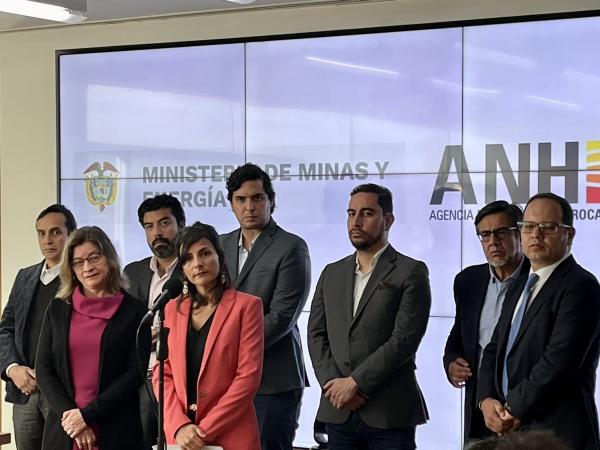According to the latest TúInfluyes survey, Carolina Tohá (57, political scientist) and Mario Marcel (63, economist) are the best evaluated ministers in President Gabriel Boric’s cabinet: she with 54% approval and he with 62%. A result that reflects both expertise and a career path.
It goes without saying that both have daunting tasks on their hands: managing a complicated political and institutional cycle –to say the least–: historic inflation and an economic recession, along with serious crime and organized crime problems, to which is added a migratory wave that does not stop and the conflict in the so-called Southern Macrozone that does not subside, to name a few flanks.
However, character and imprint it seems that they do not lack.
“They have very similar personality characteristics: strong, intense, ‘mateos’, they don’t take their bodies to work or study, they both have a cordial treatment, they have good interpersonal relationships”, details a former collaborator of both. And those who have been on the other side describe them as respectful and great negotiators. They all agree that “they love power and move fluidly in their circles.”
They assure that he has a better sense of humor, although he carries a “sheet” of parco. In fact, once he came to the Government, he opened the Instagram account @corbatasdemariomarcel (for the Executive’s no-tie style). With 11,000 followers, his cover says: “For profound but orderly and sustainable changes over time. Fiscal responsibility above all.”
Tohá is more serious in that regard. Her 14.3 thousand followers at @carolina_toha can see the difference since she was minister, with official posts that are mixed with moments from her “previous life”: photos of her children, walks near her home in Tunquén, cooking recipes… Her description states: “Minister of the Interior and Public Security of the Government of President Gabriel Boric.”
children of rigor
The political scientist and the economist share a middle-class upbringing, a taste for architecture, decoration, dogs, good food (in her case, she is vegetarian) and music. Marcel is a follower of The Beatles, but a fan of Brazilian music, especially the singer Maria Bethânia.
Tohá grew up in a political environment, very close to power and frequented by notables such as Pablo Neruda and Gabriel García Márquez. Marcel, far from that world, was clear that his goal was to study and prosper economically and intellectually.
Minister Carolina Tohá Morales has a more well-known story: she is the daughter of lawyer and politician José Tohá, who was Minister of the Interior and Defense of Salvador Allende, and Victoria (Moy) Morales. After the military coup, her father was arrested, tortured and assassinated in February 1974. Then Carolina, only eight years old, her younger brother José –now an architect living in Washington– and their mother, left that life behind (not the pain). and they settled in Mexico for five years. A time that she has described as “healing”.
Back in Santiago he finished school and entered to study Law at the University of Chile (a career that he did not finish). There she became a student leader. She was vice president of FECH between 1986 and 1988 with DC Germán Quintana as president. She was part of the No campaign and participated in the founding of the Party for Democracy (PPD) together with her political godfather, Ricardo Lagos Escobar. With the return to democracy she decided to take her own time and she left for Italy, where she studied Political Science and obtained a PhD at the Università degli Studi in Milan.
Her political itinerary is recorded: her periods as deputy for Santiago (2002 and 2009) stand out; In her second candidacy (2005), she was involved in the Servel-Publicam case, for issuing false invoices to justify campaign expenses. An investigation from which she emerged free of responsibility and whose case was closed in 2008. She was the first woman to assume the General Secretariat of the Government, during the first term of Michelle Bachelet; she was in charge of the command of the second presidential candidacy of Eduardo Frei Ruiz-Tagle; She was president of the PPD (2010-2012), at a time when the Public Ministry investigated the illegal financing of the party by Soquimich –in the framework of the SQM case–. She tohá she declared she was not related to the payments, the case was closed, but the situation hit her hard. She was also mayor of Santiago (2012-2016), a period during which the Comptroller’s Office maintains an investigation for possible “inappropriate and unsupported expenses”, a process that cost her to lose her re-election.
Mario Marcel Cullell is the son of Mario Marcel Ahumada and Nuria Cullell Camaros, who came to the country escaping the Spanish Civil War. They put all their energy into working and getting ahead, which is why the minister was clear since he was a child that he would be the first university student in his family. He was always an outstanding student at the National Institute and later at the FEN of the University of Chile. He completed a master’s degree in economics at Cambridge University and a PhD in economics, at the same institution, from which he did not graduate.
He was a researcher at Cieplan; executive secretary of the Interministerial Committee for the Modernization of Public Management; Director of Budgets (Dipres); Executive Director for Chile at the Inter-American Development Bank (IDB) in the United States; he headed the “Marcel Commission”, which laid the foundations for the pension reform that was approved in 2008; he was deputy director of Governance and Territorial Development of the OECD; President of the Central Bank, in addition to carrying out various consultancies.
And something very important to him: he is a shareholder (he owns 15.25% of the property) of Fabrestel, the family SME that manufactures electrical resistances, founded by his father and whose manager is today his cousin Cristián Marcel.
respect and admiration
Despite being contemporaries at the University of Chile, Tohá and Marcel never met during their student days. Perhaps because the FEN lived in a kind of bubble with respect to other faculties. But his path crossed several times afterwards. One of those was in the Budget Office (Dipres). The Minister of the Interior has acknowledged that Marcel hired her at Dipres in the late 1990s, when she was returning from Italy and he was the agency’s deputy director. Later, in the Government of Ricardo Lagos, when he assumed the leadership of Dipres and she was undersecretary of the General Secretariat of Government, both participated in the project to strengthen civil society.
The friendship continued while she was mayor and he was a director of the Central Bank.
“Mario was my third boss (…), with great difficulty we managed to raise an eyebrow when something seemed right to him, the problem is that when something seemed wrong, he raised exactly the same eyebrow. Then one could say: ‘How difficult to work with a boss like that, but the truth is that it was the opposite’. (…) The truth is that this gentleman who has been accused of being a hawk who defends the interests of the powerful, of being a handyman who hides money, who has been accused of being an insensitive technocrat who does not connect with the citizen feelings, has been behind some of the most progressive reforms that have been made since the return to democracy”, Tohá said in his speech during the tribute that Clases UC made to the current head of the Treasury, when he left the Central Bank.
That is why those close to him were not surprised that it was Marcel himself who intervened so that Tohá came to replace Izkia Siches, in the cabinet change last September.
Although the idea of “adding” her to the Government began to take shape in May, when President Boric decided to “visit her”, as he does – from time to time – with different political figures, to “talk”. He immediately admired her experience, clarity, and her upfront style. The original idea of the President – they say – was to put it in charge of the General Secretariat of the Presidency (Segpres). For this reason, they say that until the last minute she was convinced that she would replace Giorgio Jackson. But Marcel’s hand acted. They assure that she needed a counterpart in charge of the political team. And she, in her eyes, was the ideal.
So Tohá settled in Interior. And, by the way, Democratic Socialism was left in charge of pulling the strings of the Government both in security and in investment and spending, something like the lungs of the Executive.









